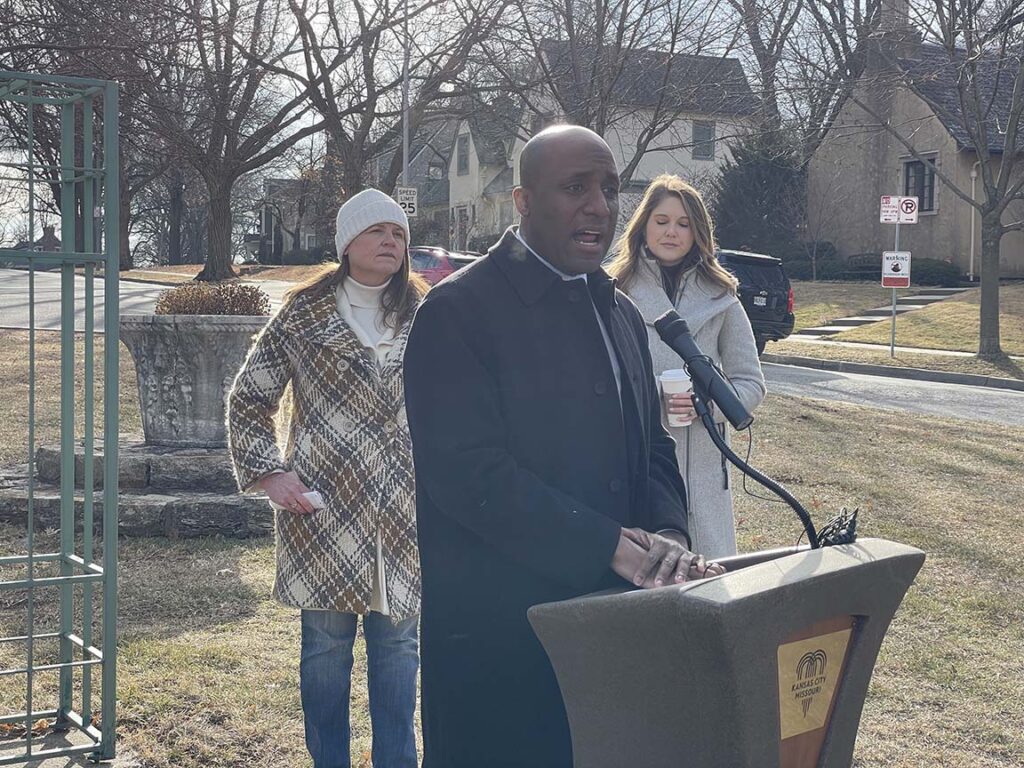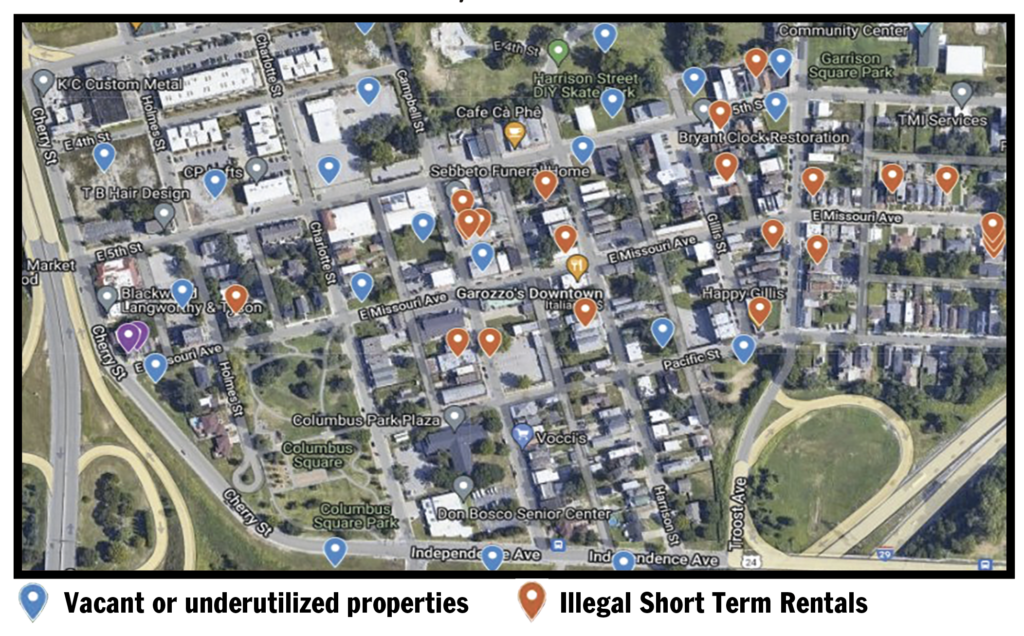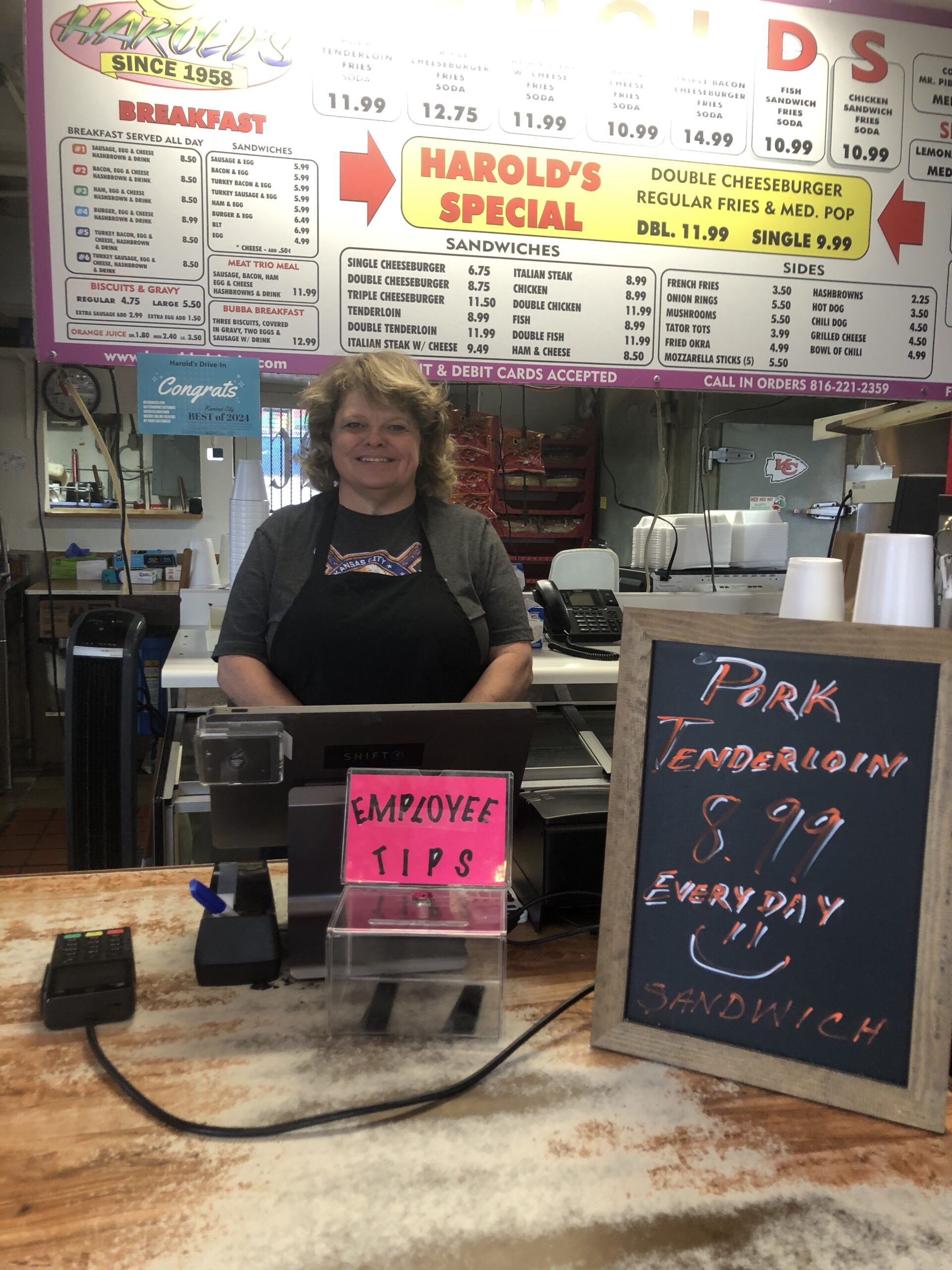
Abby Hoover
Managing Editor
Columbus Park, a historic urban neighborhood near downtown Kansas City, is being overrun by unregistered Short Term Rentals (STR), neighbors say. Now, the City is working on solutions that could have STR property owners paying their fair share.
On January 12, the Columbus Park Community Council (CPCC) sent a letter to Mayor Quinton Lucas, City Manager Brian Platt, and the City Council detailing the rapid proliferation of illegal STRs, advertised on sites like Airbnb and Vrbo. Their main concern, and their urgent requests to the City, are focused on Type 2, non-owner occupied units.
“We have a group of volunteers diligently trying to track these unpermitted businesses, and we are overwhelmed with that task, discovering new, illegal Airbnbs each week,” the letter said. “Columbus Park is becoming an unwilling hotel district.”
The most recent count found more than 25 listings on Airbnb for Columbus Park, only two of them registered with the City.
The neighborhood council requested the City issue a moratorium on all new STR permits for six months to give the City time to craft an enforceable set of ordinances to protect neighborhoods.
Columbus Park leaders ask the City to no longer allow Special Use Permits as a method of obtaining an STR permit, especially without the approval of adjacent neighbors.
“A Special Event permit, however, would allow Kansas City to scale up its available rooms during certain events, such as the World Cup,” the letter read. “This effort could include best practices and training for new hosts, helping to create a safe and welcoming environment.”
“STRs operating illegally, 90% or more [of them], should be put out of business and not granted a future license, especially for Type 2,” according to the letter. “These operators are often cash buyers for homes and multi-family buildings, and have multiple STR properties. They have the means to follow the ordinance and have chosen to defy it. Opening up any business can be challenging, whether it’s a restaurant or salon, yet they do not operate without the proper inspections and permits.”
A frustration for Columbus Park neighbors, online platforms do not perform background checks on hosts or guests, causing safety concerns and straining police resources.
They request that violations recorded in the city’s 311 Action Center should be coordinated with police reports to give a complete understanding of a troublesome property.
The CPCC would like to see the City remove Type 2 STRs from residentially zoned districts citywide, and rather streamline compliance for Type 1.
The neighborhood, which has seen steady increase in housing prices, asks the City to consider how STRs, as well as bulk buying of homes in targeted neighborhoods by real estate brokerages, may widen the gap in wealth and homeownership, increasing economic inequality and displacement in Kansas City.
They ask the City not to underestimate the reduction in the neighborhood’s political voice and future census funding.
“This depopulation could undo recent gains in the urban core,” the letter said. “Replacing residents with transient visitors could have significant funding consequences. Columbus Park is home to families who have lived here for generations. It is not fair for their interests to be weakened by scofflaws and speculative businesses… The revenue from STRs may look good at first glance, but in context, they damage local and state economies, as well as hurting the most vulnerable residents and vital programs.”
One Columbus Park tenant said her new landlord attempted to force her to break her lease and go month-to-month, making it easier to terminate the contract and replace her long-term rental with an illegal short-term one, CPCC President Kate Barsotti said. Her building has lacked working smoke alarms for weeks and the landlord is not responsive.
“This trend is more than we can absorb,” the letter said. “Columbus Park has struggled with delayed development, multiple vacant and dangerous properties, and now, illegal short-term rentals. Tenants have been forced to move and, in some cases, could not find a comparable apartment in the neighborhood although they wished to stay. Current tenants, co-existing with STRs in their building, do not know who has access to their living space as ‘guests’ move in and out.”
For Columbus Park, the neighbors are why people come and why people stay.
“We lack the historic beauty of the West Side, Hyde Park, and Coleman Highlands; we are surrounded by highways on three sides and an industrial trafficway to our north,” the letter said. “We have not had a walkable school since the 80s. We do have each other. Illegal Airbnbs are turning us into a community of strangers.”
CPCC urgently and respectfully requested the City make this problem a priority, adding that neighbors in Southmoreland and West Plaza, as well as other areas, are suffering the same way.
“Other cities have, over time, strengthened their restrictions against the proliferation of STRs: we urge an aggressive approach at the outset instead of a cautious strategy,” the letter concludes. “This industry is becoming an international investment and real estate business, buying up homes in bulk. Communities are commodities to them.”
As Columbus Park Community Council sent their letter to Lucas, Platt and City Council, the Council approved new short-term enforcement and regulation measures, including the passage of an ordinance to ask voters in April whether short-term rentals shall be taxed like hotels and motels in Kansas City.
Kansas City defines a Short Term Rental as the rental of property, a dwelling unit or a portion thereof for a period of less than 30 consecutive days, unless the rental meets the definition of “lodging” or “bed and breakfast.”
The City conducted a community-wide survey on short term rentals from November 16 to Decemer 15, 2022.
The ballot language for April is as follows: “Shall the City be authorized to impose the following license fee for the purpose of funding convention and tourism activities:
Up to an additional $1.50 per occupied sleeping room per day on all hotels, motels and tourist courts, with such fees being in addition to the existing $1.50 occupancy fee on hotels and motels for a combined fee of $3.00 per occupied sleeping room per day also to be applied to all short-term rentals conducting business within the City?”
On Friday, Jan. 13, city leaders gathered in the Armour Hills neighborhood to discuss ongoing efforts to regulate short-term rentals.
“I am very proud that this week, your city government, City Council, Mayor’s Office and others decided to act, and to act to make sure we have two very important things: fairness and enforcement for our neighbors,” Lucas said. “On the fairness side, for years and years in our city, we’ve had Airbnbs, Short Term Rentals and others who’ve been operating outside of many of our rules.”
Hotels and motels pay fees and taxes, making sure they’re contributing back to the city, Lucas said, but in too many cases, Short Term Rental operators have not.
The City is proposing two different issues for the springtime ballot, one of which relates to making sure that STRs like Airbnb or VRBOs actually pay fees like hotels and motels do.
“I know a lot of people sometimes try to say that Short Term Rentals or Airbnbs are just somebody who’s renting off an extra room and perhaps a carriage house,” Lucas said. “However, in reality, there are a lot of folks in Kansas City that own 40, 80, 120 different single family homes that are being used as Short Term Rentals. They are operating like hotels, they’re operating as substitutes for hotels and motels.”
The City found it important to work with so many partners in the lodging industry to make sure that they addressed that fairness and inequity long-term.
“The other looks to make sure that we are actually increasing a fee – that has not been increased since 2004 – to make sure that Kansas City can not only fund convention and tourism as we look at items like a World Cup coming up, the NFL Draft, but also to make sure that we’re giving General Fund relief so that we have money for enforcement for Short Term Rentals, in neighborhoods like this one, to make sure that we’re keeping up with so many of the issues that we’ve heard over time.”
Lucas said he’s heard from concerns from many different neighborhoods – parties, increased trash, and violence.

“We want to just make sure that we are addressing that issue fundamentally,” Lucas said. “No longer should it be that people have to deal with issues relating to Airbnb and get no answer from City Hall with the steps you’re seeing taken today. We’ll make sure we have a better regulatory apparatus. We’ll make sure that we have revenues to address these long-term concerns. More than anything, we will make sure that Kansas City can deliver on the basic services necessary.”
First District At-Large Councilman Kevin O’Neill said the actions are necessary for a number of reasons.
“Number one, the hotels in our city have been burdened by the short term rentals for many years and it’s an unfair playing field, and I think we leveled the playing field today. That’s really important,” O’Neill said. “The second thing is, when I go to neighborhood meetings, one of the top priorities for the neighborhood is, ‘How do we get rid of these Short Term Rentals? They bring in lots of noise, they bring in lots of parties.’ And I think this is just the first step.”
O’Neill said density of Short Term Rentals should also be looked into. The next step will be making processes that make it easier to identify these houses and to get more more stringent rules enforced, he added.
The City Auditor’s Office recently issued two audits on Short Term Rentals, Auditor Doug Jones said.
“The first audit, we concluded Short Term Rentals are a significant part of the accommodation industry in Kansas City, Missouri, roughly the equivalent of two downtown convention hotels, and they are not currently required to pay the convention and tourism taxes typically paid by most hotels in the city,” Jones said. “We made recommendations to the mayor and the City Council to take steps so these convention and tourism taxes and fees are applied uniformly to Short Term Rentals, hotels and motels.”
Imposing hotel and motel taxes and fees on STRs could bring in about $13 million in additional revenue over the next five years for the City’s tourism related activities, Jones said.
In the second audit, the department concluded that few short term rental hosts are actually complying with City’s permit requirements – something Columbus Park residents already know firsthand.
“Since 2018, we estimate only about 7% of short term rental hosts have gotten a permit,” Jones said. “This has resulted in a loss of about $1.1 million in permit revenues, and that’s revenue that would have paid for enforcement and management activities.”
They found that existing regulations did not provide managers with the tools that they need to effectively enforce the requirements, compared to other cities.
“Hence these regulations do not clearly require hosts to obtain permits before listing on the platforms, and they don’t require the platforms to check for a permit before they allow somebody to list.”
Jones estimates the financial impact of permit fees to add up to about $1.1 million over the next five years.
Effective enforcement starts with permits, Jones said. All subsequent enforcement actions, related to operations and nuisance, flow from STR units having a permit.
“Implementing our recommendations can help the City provide resources to fund enforcement efforts, as well as information about Short Term Rental owners and relationships with the booking platforms that will also help supplement those enforcement actions on the nuisance properties,” Jones said.
Andrea O’Hara, Executive Director of the Hotel & Lodging Association of Greater Kansas City, thanked the Council and mayor for recognizing the opportunity to level the playing field for hotels.
O’Hara said a portion of the new funds will go to VisitKC to help promote the destination as a convention and visitors place to be. The hotel community’s priority has been to ensure that guests of STRs pay the same taxes and the same fees that guests at hotels pay.
“While we don’t feel it’s our position to dictate what a resident could do with their property, as homeowners, we do understand the concerns and the challenges that it can create for a neighborhood,” O’Hara said. “We feel this step to implement the new tax, or the new fee, is a great step in the right direction for both parties, both the hotel and the residents.”
Tiffany Moore, 6th District Representative of the Kansas City Neighborhood Advisory Council (KCNAC), thanked Lucas for including the neighborhood voice in the conversation around STRs.
“The same is true of Council, they’ve been very open to hearing what the people that live in Kansas City have to say on this topic, and that’s extremely important to us,” Moore said. “We represent the interests of neighborhoods which include condos, apartments and single family home communities. We’re encouraged by the steps that the mayor, Council and staff have begun to take in closing the gaps on our Short Term Rental policy, but this is just the beginning and there’s a lot more work to be done. We look forward to working together on a strong short term rental policy that protects our vibrant unique neighborhoods because neighborhoods are where Kansas City lives.”
Fourth District City Councilman Eric Bunch assured his constituents that this is just one of the many steps the City will be taking in regards to STRs.
“To not only make sure that the Short Term Rentals are on the same level playing field as the rest of our lodging opportunities, in terms of taxes and fees, but also that we’re going to do a much better job of enforcing the ordinances that we have on the books and addressing the nearly 2,000 unlicensed Short Term Rentals that exist in the city,” Bunch explained.
Lucas said the new taxes or fees will be passed on to visitors to Kansas City, not the STR owners.
“Certain single family neighborhoods, having that impact because they’re not actually built up to actually have the amount of traffic, the number of people coming through, even trash disposal in the same way,” Lucas said. “And so that is why we actually look at the impact for some neighborhoods. That said, it’s an issue citywide. We’re not doing enough registration or enforcement in all parts of the city, so this is at least a step for us to say, ‘Not only in residential neighborhoods, but throughout the city we will start to address the concern.’”
Some neighborhoods in the city are more impacted, they tend to be within walkable distances to entertainment districts and other attractions, Moore said, noting Columbus Park and West Plaza.
“I’m very happy right now with what the city is doing,” said Barsotti, who is also a KCNAC representative. “I feel like they’re taking steps and they’re listening to us, which is all I can ask. They seem to take this very seriously. So I have a lot of hope right now that we may be able to get a moratorium in place.”
As a neighborhood that has experienced real safety concerns related to guests in unregistered STRs, like shootings, theft and sex trafficking, Barsotti knows these next steps are going to take time.
“We are seeing an uptick in crime related to Airbnb, which is why we want to get started now,” Barsotti said. “I’ve looked at research recently that says over time that it does degrade your social fabric and it makes it harder to police your own neighborhood because you’re used to strangers coming and going. I think short term rentals in general, especially dedicated ones, can be attractive to criminals, and we don’t want that in our neighborhood.”
Columbus Park’s housing inventory was already suffering, but recently it’s been made worse by property owners targeting potential STRs.
“I have seen some frightening tenant treatment that very much concerns me,” Barsotti said. “They have been displaced, they can’t find another affordable place to live. They have been, in some cases I would say, threatened with maintenance not being fixed. They don’t have working fire alarms. They are pressured into going month-to-month so the landlord can force them out more easily and turn it to illegal Airbnb. Our first concern is for our tenants because they have been affected first.”
Barsotti said in Columbus Park, smaller multifamily properties – duplexes, triplexes and six-plexes – are being targeted, although investors have also started buying up single family homes.
Lucas said the Legal Department has vetted the plan and finds it “an absolutely valid imposition of tax,” and that state legislation was never intended to allow, basically, individually owned hotels and motels to operate fundamentally differently from other hotels and motels.
Kansas City voters will decide whether to tax Short Term Rentals like hotels on the April ballot. Until then, Columbus Park neighborhood leaders and others are hopeful that things may soon change.

















